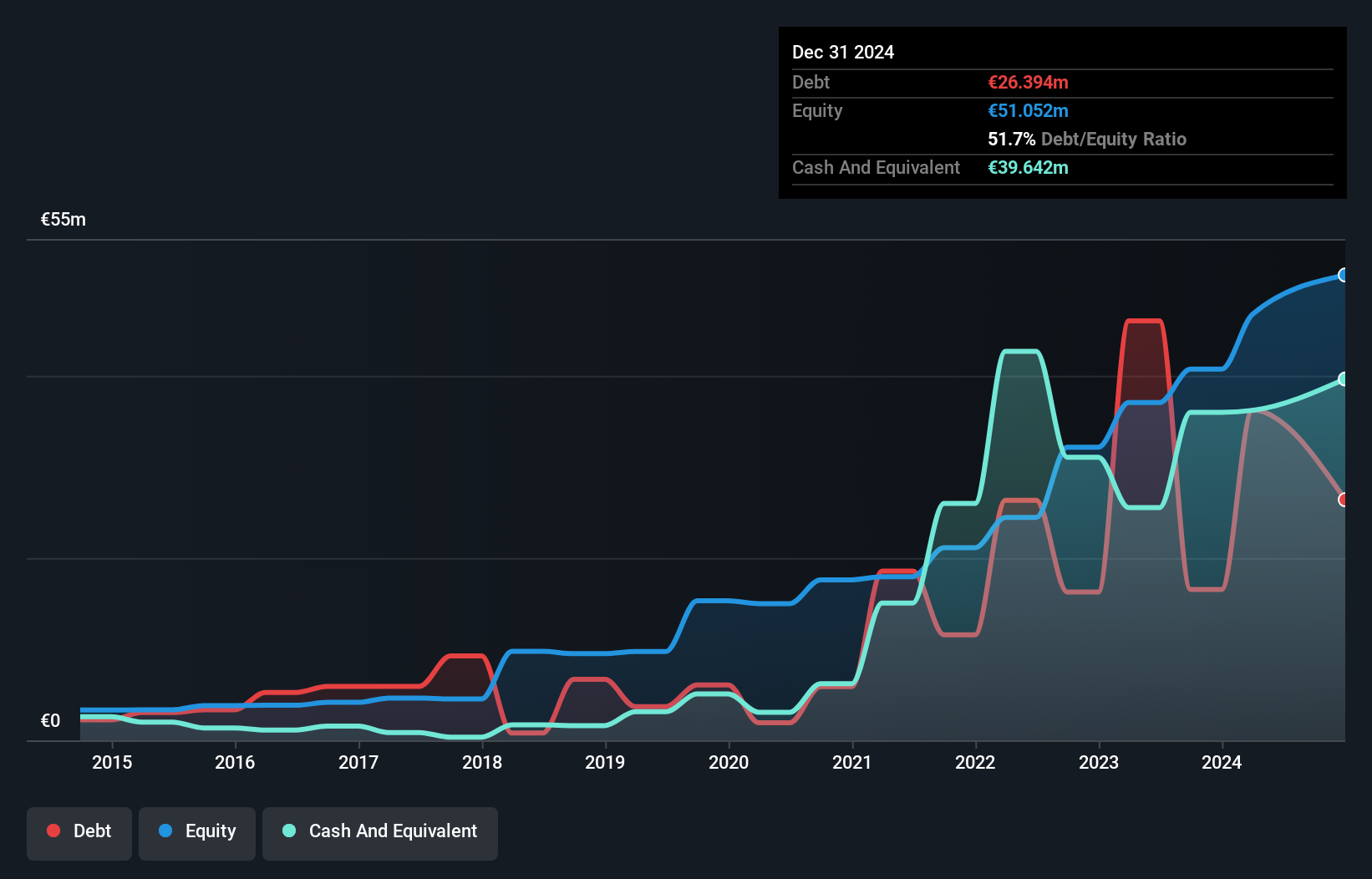David Iben put it well when he said, 'Volatility is not a risk we care about. What we care about is avoiding the permanent loss of capital.' When we think about how risky a company is, we always like to look at its use of debt, since debt overload can lead to ruin. We note that HMS Bergbau AG (ETR:HMU) does have debt on its balance sheet. But is this debt a concern to shareholders?
When Is Debt Dangerous?
Debt is a tool to help businesses grow, but if a business is incapable of paying off its lenders, then it exists at their mercy. If things get really bad, the lenders can take control of the business. However, a more usual (but still expensive) situation is where a company must dilute shareholders at a cheap share price simply to get debt under control. Of course, debt can be an important tool in businesses, particularly capital heavy businesses. When we think about a company's use of debt, we first look at cash and debt together.
What Is HMS Bergbau's Debt?
As you can see below, at the end of December 2024, HMS Bergbau had €26.4m of debt, up from €16.5m a year ago. Click the image for more detail. But on the other hand it also has €39.6m in cash, leading to a €13.2m net cash position.

A Look At HMS Bergbau's Liabilities
According to the last reported balance sheet, HMS Bergbau had liabilities of €149.1m due within 12 months, and liabilities of €19.9m due beyond 12 months. Offsetting these obligations, it had cash of €39.6m as well as receivables valued at €140.1m due within 12 months. So it actually has €10.7m more liquid assets than total liabilities.
This surplus suggests that HMS Bergbau has a conservative balance sheet, and could probably eliminate its debt without much difficulty. Simply put, the fact that HMS Bergbau has more cash than debt is arguably a good indication that it can manage its debt safely.
Check out our latest analysis for HMS Bergbau
Another good sign is that HMS Bergbau has been able to increase its EBIT by 30% in twelve months, making it easier to pay down debt. There's no doubt that we learn most about debt from the balance sheet. But ultimately the future profitability of the business will decide if HMS Bergbau can strengthen its balance sheet over time. So if you want to see what the professionals think, you might find this free report on analyst profit forecasts to be interesting.
Finally, while the tax-man may adore accounting profits, lenders only accept cold hard cash. While HMS Bergbau has net cash on its balance sheet, it's still worth taking a look at its ability to convert earnings before interest and tax (EBIT) to free cash flow, to help us understand how quickly it is building (or eroding) that cash balance. Looking at the most recent three years, HMS Bergbau recorded free cash flow of 31% of its EBIT, which is weaker than we'd expect. That's not great, when it comes to paying down debt.
Summing Up
While it is always sensible to investigate a company's debt, in this case HMS Bergbau has €13.2m in net cash and a decent-looking balance sheet. And we liked the look of last year's 30% year-on-year EBIT growth. So we don't think HMS Bergbau's use of debt is risky. When analysing debt levels, the balance sheet is the obvious place to start. However, not all investment risk resides within the balance sheet - far from it. These risks can be hard to spot. Every company has them, and we've spotted 1 warning sign for HMS Bergbau you should know about.
Of course, if you're the type of investor who prefers buying stocks without the burden of debt, then don't hesitate to discover our exclusive list of net cash growth stocks, today.
Valuation is complex, but we're here to simplify it.
Discover if HMS Bergbau might be undervalued or overvalued with our detailed analysis, featuring fair value estimates, potential risks, dividends, insider trades, and its financial condition.
Access Free AnalysisHave feedback on this article? Concerned about the content? Get in touch with us directly. Alternatively, email editorial-team (at) simplywallst.com.
This article by Simply Wall St is general in nature. We provide commentary based on historical data and analyst forecasts only using an unbiased methodology and our articles are not intended to be financial advice. It does not constitute a recommendation to buy or sell any stock, and does not take account of your objectives, or your financial situation. We aim to bring you long-term focused analysis driven by fundamental data. Note that our analysis may not factor in the latest price-sensitive company announcements or qualitative material. Simply Wall St has no position in any stocks mentioned.
About XTRA:HMU
HMS Bergbau
Engages in trading and distributing coal and other energy raw materials to energy producers, cement manufacturers, and industrial consumers worldwide.
Good value with reasonable growth potential.
Market Insights
Community Narratives



